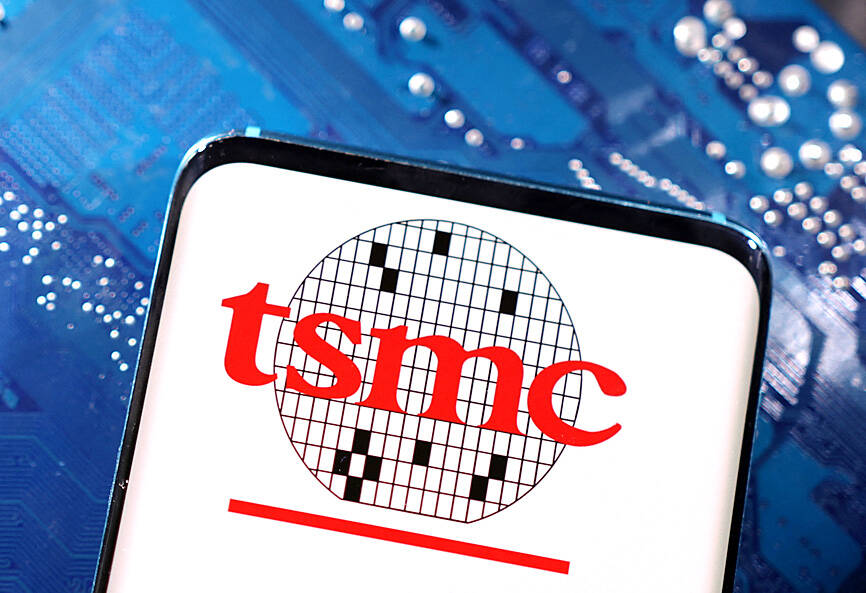The Investment Commission yesterday approved a Taiwan Semiconductor Manufacturing Co (TSMC, 台積電) application to invest an additional US$3.5 billion in its Arizona subsidiary to manufactured advanced chips.
The world’s largest contract chipmaker’s board of directors last month approved the funding project after TSMC started moving manufacturing equipment into the fab in December last year in preparation for the production of 4-nanometer chips next year.
TSMC said it has also commenced the second phase of facility construction in Arizona.

Photo: Reuters
The second fab is to produce semiconductors using 3-nanometer technology in 2026. Altogether, TSMC plans to spend US$40 billion on the Arizona fabs, doubling its original investment of US$20 billion.
The US became the fastest-growing overseas investment destination for local enterprises last year, enjoying an annual growth rate of 128.32 percent to US$1.09 billion from 100 projects, the commission said in a statement.
Cloud-based server maker Wiwynn Corp (緯穎科技) plans to invest US$400 million on its US marketing subsidiary Wiwynn International Corp to meet robust demand from the US market, it said.
It approved that investment plan during yesterday’s meeting.
It also approved a plan from Hon Hai Precision Industry Co (鴻海精密), a major iPhone assembler, to invest US$500 million indirectly in India to produce iPhones and smartphone components through its Foxconn Singapore Pte Ltd subsidiary.
The company was also granted approval to invest more than US$361 million indirectly in its Mexican subsidiary to make components used in electric vehicles through its Singaporean unit ECMMS Precision Singapore Pte Ltd, the commission said.
PharmaEssentia Corp (藥華醫藥) received permission to invest US$80 million in its Japanese subsidiary and US$200 million in a US subsidiary, as the company prepares to sell new drugs in the countries, it said.
The commission also approved Yunlin Holding GmbH’s plan to invest NT$29.23 billion (US$962.4 million) in offshore wind energy developer Yunneng Wind Power Co (允能), a subsidiary of Skyborn Renewable Taiwan Co (天豐新能源), to improve its financial structure.
The company is developing an offshore wind power project off Taiwan’s west coast, which is to comprise 80 wind turbine generators with a total capacity of 640 megawatts rated power.

UNCERTAINTY: Innolux activated a stringent supply chain management mechanism, as it did during the COVID-19 pandemic, to ensure optimal inventory levels for customers Flat-panel display makers AUO Corp (友達) and Innolux Corp (群創) yesterday said that about 12 to 20 percent of their display business is at risk of potential US tariffs and that they would relocate production or shipment destinations to mitigate the levies’ effects. US tariffs would have a direct impact of US$200 million on AUO’s revenue, company chairman Paul Peng (彭雙浪) told reporters on the sidelines of the Touch Taiwan trade show in Taipei yesterday. That would make up about 12 percent of the company’s overall revenue. To cope with the tariff uncertainty, AUO plans to allocate its production to manufacturing facilities in

Taiwan will prioritize the development of silicon photonics by taking advantage of its strength in the semiconductor industry to build another shield to protect the local economy, National Development Council (NDC) Minister Paul Liu (劉鏡清) said yesterday. Speaking at a meeting of the legislature’s Economics Committee, Liu said Taiwan already has the artificial intelligence (AI) industry as a shield, after the semiconductor industry, to safeguard the country, and is looking at new unique fields to build more economic shields. While Taiwan will further strengthen its existing shields, over the longer term, the country is determined to focus on such potential segments as

Chizuko Kimura has become the first female sushi chef in the world to win a Michelin star, fulfilling a promise she made to her dying husband to continue his legacy. The 54-year-old Japanese chef regained the Michelin star her late husband, Shunei Kimura, won three years ago for their Sushi Shunei restaurant in Paris. For Shunei Kimura, the star was a dream come true. However, the joy was short-lived. He died from cancer just three months later in June 2022. He was 65. The following year, the restaurant in the heart of Montmartre lost its star rating. Chizuko Kimura insisted that the new star is still down

While China’s leaders use their economic and political might to fight US President Donald Trump’s trade war “to the end,” its army of social media soldiers are embarking on a more humorous campaign online. Trump’s tariff blitz has seen Washington and Beijing impose eye-watering duties on imports from the other, fanning a standoff between the economic superpowers that has sparked global recession fears and sent markets into a tailspin. Trump says his policy is a response to years of being “ripped off” by other countries and aims to bring manufacturing to the US, forcing companies to employ US workers. However, China’s online warriors